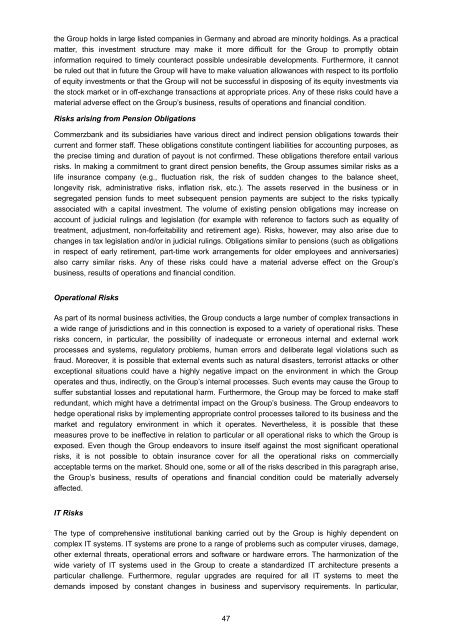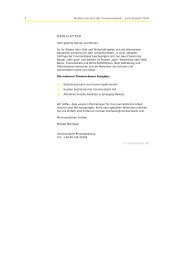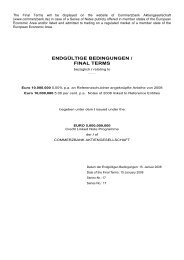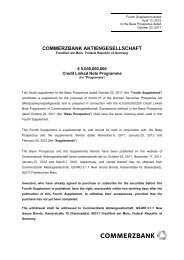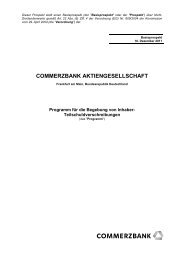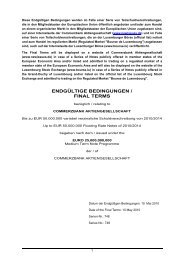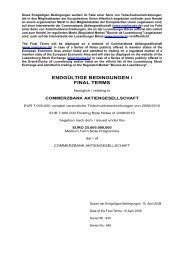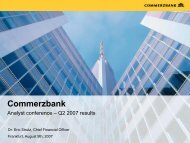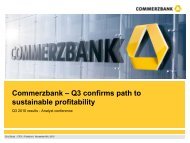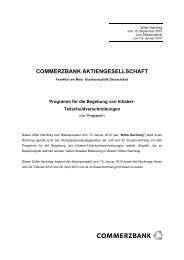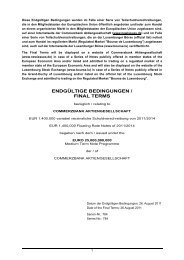COMMERZBANK AKTIENGESELLSCHAFT
COMMERZBANK AKTIENGESELLSCHAFT
COMMERZBANK AKTIENGESELLSCHAFT
You also want an ePaper? Increase the reach of your titles
YUMPU automatically turns print PDFs into web optimized ePapers that Google loves.
the Group holds in large listed companies in Germany and abroad are minority holdings. As a practical<br />
matter, this investment structure may make it more difficult for the Group to promptly obtain<br />
information required to timely counteract possible undesirable developments. Furthermore, it cannot<br />
be ruled out that in future the Group will have to make valuation allowances with respect to its portfolio<br />
of equity investments or that the Group will not be successful in disposing of its equity investments via<br />
the stock market or in off-exchange transactions at appropriate prices. Any of these risks could have a<br />
material adverse effect on the Group’s business, results of operations and financial condition.<br />
Risks arising from Pension Obligations<br />
Commerzbank and its subsidiaries have various direct and indirect pension obligations towards their<br />
current and former staff. These obligations constitute contingent liabilities for accounting purposes, as<br />
the precise timing and duration of payout is not confirmed. These obligations therefore entail various<br />
risks. In making a commitment to grant direct pension benefits, the Group assumes similar risks as a<br />
life insurance company (e.g., fluctuation risk, the risk of sudden changes to the balance sheet,<br />
longevity risk, administrative risks, inflation risk, etc.). The assets reserved in the business or in<br />
segregated pension funds to meet subsequent pension payments are subject to the risks typically<br />
associated with a capital investment. The volume of existing pension obligations may increase on<br />
account of judicial rulings and legislation (for example with reference to factors such as equality of<br />
treatment, adjustment, non-forfeitability and retirement age). Risks, however, may also arise due to<br />
changes in tax legislation and/or in judicial rulings. Obligations similar to pensions (such as obligations<br />
in respect of early retirement, part-time work arrangements for older employees and anniversaries)<br />
also carry similar risks. Any of these risks could have a material adverse effect on the Group’s<br />
business, results of operations and financial condition.<br />
Operational Risks<br />
As part of its normal business activities, the Group conducts a large number of complex transactions in<br />
a wide range of jurisdictions and in this connection is exposed to a variety of operational risks. These<br />
risks concern, in particular, the possibility of inadequate or erroneous internal and external work<br />
processes and systems, regulatory problems, human errors and deliberate legal violations such as<br />
fraud. Moreover, it is possible that external events such as natural disasters, terrorist attacks or other<br />
exceptional situations could have a highly negative impact on the environment in which the Group<br />
operates and thus, indirectly, on the Group’s internal processes. Such events may cause the Group to<br />
suffer substantial losses and reputational harm. Furthermore, the Group may be forced to make staff<br />
redundant, which might have a detrimental impact on the Group’s business. The Group endeavors to<br />
hedge operational risks by implementing appropriate control processes tailored to its business and the<br />
market and regulatory environment in which it operates. Nevertheless, it is possible that these<br />
measures prove to be ineffective in relation to particular or all operational risks to which the Group is<br />
exposed. Even though the Group endeavors to insure itself against the most significant operational<br />
risks, it is not possible to obtain insurance cover for all the operational risks on commercially<br />
acceptable terms on the market. Should one, some or all of the risks described in this paragraph arise,<br />
the Group’s business, results of operations and financial condition could be materially adversely<br />
affected.<br />
IT Risks<br />
The type of comprehensive institutional banking carried out by the Group is highly dependent on<br />
complex IT systems. IT systems are prone to a range of problems such as computer viruses, damage,<br />
other external threats, operational errors and software or hardware errors. The harmonization of the<br />
wide variety of IT systems used in the Group to create a standardized IT architecture presents a<br />
particular challenge. Furthermore, regular upgrades are required for all IT systems to meet the<br />
demands imposed by constant changes in business and supervisory requirements. In particular,<br />
47


